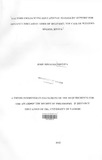| dc.contributor.author | Mbugua, John M | |
| dc.date.accessioned | 2013-02-12T14:44:31Z | |
| dc.date.available | 2013-02-12T14:44:31Z | |
| dc.date.issued | 2012 | |
| dc.identifier.uri | http://erepository.uonbi.ac.ke:8080/xmlui/handle/123456789/8431 | |
| dc.description.abstract | In many countries distance learning has been adopted and has had significant success in terms of accommodating large number of students at the same time. Despite Distance Education. (DE) mode of learning having been introduced in Kenya in the 1960s at the University of Nairobi only a few students are reported to have completed various courses through the mode. This study seeks to establish the factors that influence support by educational managers for DE mode of learning in Western Region.
The study undertook to answer the following four research questions: The first research question was to what extent do the educational managers' level of awareness of DE mode of delivery influence their support for DE mode in Western Region of Kenya? The second question was to what extent do the attitudes of educational managers in Western Region influence their support for DE mode of delivery? The research sought to establish to what extent do persorial characteristics - Gender, professional qualifications, work experience and administrative position- held influence their support for DE learners in Western Region? Finally the study focused on to what extent does the government policy on DE influence educational managers' support for distance learning mode of delivery? In addition to these research questions seven hypotheses were tested at 0.05 level of significance.
The data collected was analyzed using both qualitative and qualitative techniques which revealed that the educational managers' support for DE mode of learning was influenced by personal characteristics such as working experience, position held and subject specialization. Further the level of awareness of educational managers about distance learning mode was also found to be having a significant influence on their support for DE mode of learning. The educational Managers' attitudes towards DE mode of learning were also found to have influence on their support for 'DE mode of learning. The study recommended that teacher training institutions should revise their syllabuses to include DE units in their new syllabuses. This would expose students undergoing educational courses to appreciate DE's strengths, weaknesses and situational application for suitability.
Further a major campaign also needs to be organized to sensitize existing educational managers of the effectiveness and efficiency of DE mode of learning. It was evident that attitude of majority of educational managers was not based on facts but on mere beliefs. A reasonable number of those who participated in the study were not fully exposed to distance learning mode despite their background in education and their work experiences. More research needs to be facilitated to establish the situational effectiveness of various modes of learning. This would allow stakeholders to make informed decisions regarding appropriate mode of learning taking cognizance of prevailing circumstances. The government needs to review its policy on education to provide an enabling environment for employees / students undergoing DE programme while working. | en_US |
| dc.language.iso | en_US | en_US |
| dc.publisher | University of Nairobi, Kenya | en_US |
| dc.title | Factors influencing educational managers' support for distance education mode of delivery: the case of Western Region, Kenya | en_US |
| dc.title.alternative | Thesis (PhD) | en_US |
| dc.type | Thesis | en_US |

